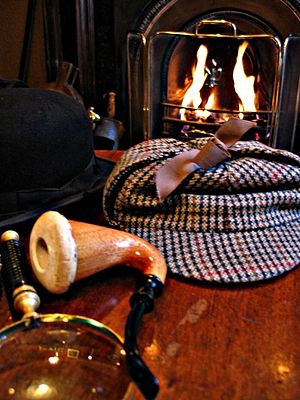 Image via Wikipedia
Image via Wikipedia
I bring it up because: May 22, 2009 would have been Sir Arthur Conan Doyle's 150th birthday, and Doyle pretty much made the study of fictional canon necessary. Doyle created Sherlock Holmes, whom everyone knows wore a deerstalker cap and often prefaced his famous modus ponens deductions with the catchphrase "elementary, my dear Watson." Except that Doyle never described Holmes as wearing a deerstalker cap or saying "elementary, my dear Watson" in any Holmes work he wrote; those aspects of the character are assumed parts of Holmes' description based on popular illustrations and derivative literary, stage, film, and television adaptationsbut are non-canon. There are actually more non-canon Holmes works than canonical ones, so it's easy to see how the popular conception of the character has been stretched beyond its original canon. And the new Sherlock Holmes movie is going to stretch it even further.
![Reblog this post [with Zemanta]](http://img.zemanta.com/reblog_e.png?x-id=5fbf4315-9a7c-45b6-b02b-02c765e56849)
Good one today, though mainly because I'm going to get a ton of supercilious mileage out of modus ponens over the next several weeks.
ReplyDeleteDon't be surprised to hear me finding some way to squeeze it in on upcoming Tech Talks, even if I have to use a crow bar! ;)